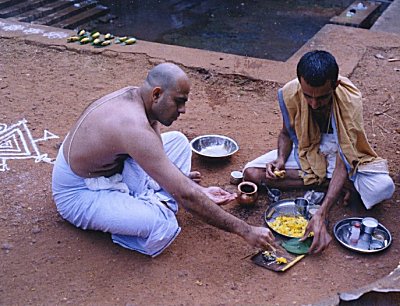Antyeshti - The Last Rites
by Dr. Jyotsna Kamat
First Online: November 05, 2005
Page Last Updated: December 07, 2024
"May the all-knowing Pushan (Sun) who protects the world dispatch thee from this world to next. May he hand thee over to the pitrs (ancestors). Let Agni hand you over to Gods. Pushan who knows all quarters may take thee by a path free from all dangers" says a mantra recited at the beginning of funeral march.
The dead body was washed, anointed with sandal paste, decked with flowers (order funeral flowers) and covered with new unbleached cloth.
The body then was carried to cremation ground. Yama (see: Yama, the God of death) was invoked to give a final resting place to the departed. After few more rites, fire was kindled. The cremation was conceived as a sacrifice and the cremated was a gift to Gods in heaven.
"O departed one! Be united in the highest heaven with the pitrs and with Yama. Leaving here all your sins, go back to your home. Being endowed with bright luster be united with a new body" is the mantra when the body is consumed to flames.
'Asthi Sanchaya' or collection of bones after the body was consigned to flames was next rite. It was collected in a urn and kept in the safe place.
Ashouchia or a period of un-cleanliness followed for ten days. An oil lamp was burned continuously and cooked rice was offered on all days. It was believed that this ritual helped the departed to go to his/her new home smoothly.
G.L.Kamat/Kamat's Potpourri
Hinu Funeral Proceeding
Shraddha or offerings made with deep faith and loving remembrance followed. Every day water mixed with teel (sesame seeds) was offered to the departed on a stone with Kusha grass. On the tenth day the performer made a sankalpa (holy resolve) and offered pinda (rice-ball). "May this pinda wait upon the preta named...of such gotra etc...so that the hunger and thirst affecting him/her may be appeased." After some more rites, it is ensured that the preta (the deceased) will no more remain a fugitive and would receive the status of pitr or an ancestor.
Role of Crow
It is interesting that the crow, much despised bird, becomes very important on the occasion of Pindadana. Crow is supposed to be messenger of Yama, the Lord of Death. Hence, there is a prayer. Master of the ceremony recites, "O Crow! Thou art the messenger of Yama. Please accept this offering (food-pinda) and satisfy the hunger of the departed Spirit that has proceeded to the Abode of Yama."
On the tenth day when the pinda is offered to manes, all wait eagerly for the temporarily holy crow to pounce and partake food. Delay on the part of the crow suggests that the deceased had some unfulfilled wish which was compelling. Often the priest advises the performer to declare there and then to fulfill the last wish of the departed soul. All heave a sigh of relief, when the crow descends or condescends to peck at the food!.
Pindadana relieves a preta (deceased) from the agony of hunger and thirst. Four pindas are prepared. One for the deceased and the three for his paternal ancestors. This rite known as sapindikarana completed the Antyeshti Ceremony.
For all Hindu ceremonies Agni (sacred fire), water (symbol of purifying Ganga, the sacred river), Grass (darbha), Tulasi, Earth, grains, etc. are a must. God-given bounty was seen by the ancients in simple things.
Samskars being different disciplines, were also forms of social debts to be discharged. Besides conveying their gratitude to God Almighty in different forms, alms were given to Brahmins and the poor on the occasion of antyeshti ceremony and other samskaras.
Lastly, immersion of asthi or remnants of the bones of remains in sacred rivers ensured that a man returned finally to elements from which he took his mortal form. It is believed that when a person dies, the soul assumes three of the five elements (viz., fire, wind and ether), that rise from the dead body while the two more (earth and water) remain below. With the aid of pindas offered daily during the ten days after cremation, the soul assumes yet another form and after the twelfth day performance the soul finally sheds that delicate form as well, and assumes a third body according to the nature of its karma, to go to heaven.
![]()
See Also:
- How I Sent My Father to Heaven -- Pictorial essay showing the proceedings of Hindu death ritual.
- The Call of Yama -- Discussion of death in Hinduism; includes answers to frequently asked questions, and proceedings of a Hindu funeral.

